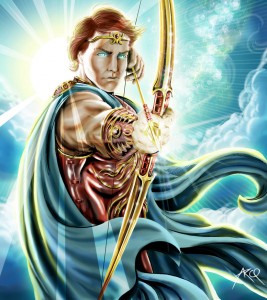 Apollo Greek God - Art Picture by ArcosArt
Apollo Greek God - Art Picture by ArcosArtApollo belongs to the second generation of the Olympian gods. He is the fruit of the love affair between Zeus and Leto and brother of Artemis. Apollo is the god of light, music, poetry, healing and divination (prophecy). Zeus, the father of gods and men, dazzled by the beauty of Leto, who was coming from the generation of the Titans, mated with her. The jealous Hera, resentful by the countless infidelities of her husband with mortals and goddesses and because she did not have the power to hurt her husband, opposed to Leto and set out to do everything in order not to let her give birth.
Leto was running in vain throughout the land, trying plains, mountains, and seas to beget her children. The whole earth refused to accept her because it was afraid of the terrible vengeance of Hera. Only a small floating island, Ortygia (Quail Island) or Asteria, agreed to give asylum to unfortunate Leto. This island was poor and barren, unable to feed sheep or oxen, but neither bear fruit vines or other trees. So that is why it did not fear the wrath of the goddess. Apollo, in order to reward the impoverished island, just after he was born, secured the island with four pillars on the seabed and gave it the name Delos (Bright).
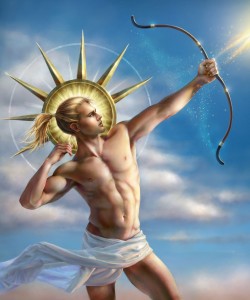 Apollo Greek God - Art Picture
Apollo Greek God - Art Picture
The pains of childbirth kept nine whole days. Leto lying at the root of a palm tree, the only tree that existed on the island, moaned in pain and implored Hera to allow her to give birth to her children. Athena, Demeter, Aphrodite, and other smaller goddesses ran to help Leto, but could not do anything without the consent of Hera, who was holding Ilithyia onto the Olympus, the goddess of successful births.
Eventually, they sent the colorful Iris, the messenger of the gods, to ask Hera to allow this childbirth, giving her a necklace of exceptional beauty of gold and amber, nine cubits long, which was built in the workshop of the great craftsman of the gods, Hephaestus. This gift calmed the anger of Hera, who sent the Eileithyia at Delos. Leto was exhausted from her agonizing pain that lasted so many days. She knelt at the root of the palm tree and gave birth first to Artemis and immediately after to Apollo. At the time of the god’s birth, holy swans flew over the island making seven circles, because it was the seventh day of the month.
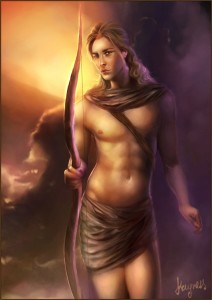 Apollo Greek God - Art Picture by Kay Ness
Apollo Greek God - Art Picture by Kay Ness
Leto did not have the time to nurse the newborn god. Once Apollo was born, Themis dripped into his mouth a few drops of nectar and a small piece of ambrosia and the miracle happened. The baby began to grow rapidly and the swaddling clothes torn apart and fell from his body. The goddesses dazzled by Apollo’s beauty, admired him while he was walking on the island. Right after, Apollo ran over to Olympus to get the blessing of his almighty father, but also to meet the other gods.
Zeus welcomed his son and gave him many rich and beautiful gifts. Among them was a golden miter adorned with rubies and emeralds, which symbolized the power of the God and had carved over it scenes from the life of the Olympians. Zeus also gave him a lyre, which Apollo loved very much and every time he played, his music charmed the gods and men. Additionally, he gave him a beautiful chariot with seven pure white swans that were carrying the god at any point of the earth or sky he wished.
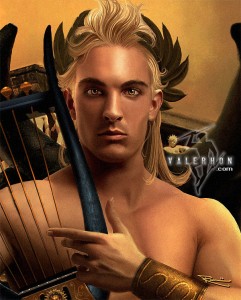 Apollo Greek God - Art Picture by Valerhon
Apollo Greek God - Art Picture by Valerhon
Zeus immediately ordered Horae (Hours) to pave a table with nectar and ambrosia to welcome the new god on Mount Olympus. A glorious feast followed that lasted until dawn. Apollo played the lyre and the Graces, Harmonia, Hebe, Aphrodite and Artemis danced. Shortly after, Hermes and Ares joined the dance. Another myth narrates that the swans, shortly after his birth, moved Apollo in their country on the shores of the ocean, the Hyperborea. There, they established the worship of the god that celebrated him incessantly. Apollo stayed at the land of the Hyperboreans for a year and returned to Greece at the midsummer.
The whole nature celebrated by any means the return of the great god. There were feasts and songs everywhere, crickets and nightingales sang and the water sources were clearer. Nymphs and Fairies of the rivers and lakes danced whole days and nights in the mountains and glades. Every year at Delphi, they were celebrating this return with carnage, namely collective sacrifices of one hundred animals.
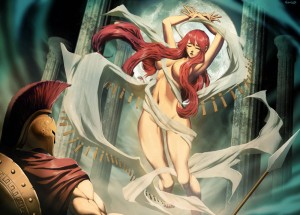 Pythia Oracle - Art Picture by GenzoMan
Pythia Oracle - Art Picture by GenzoMan
At Delphi, Apollo killed a terrible dragon named Python and had ten hands and four eyes. The dragon, which looked like a huge lizard had caused numerous disasters in the region. It was shaking springs and rivers turning the waters muddy, destroying crops, devouring flocks, and spooking the Nymphs. In fact, when it was very furious, it was strangling or drowning the needy residents. Moreover, this monster, ordered by Hera, had chased Leto when she was looking for place to give birth to her children.
Apollo, with the golden arrows that Hephaestus gave him, killed Python and thus acquitted the local residents from this menace. The residents, in order to to remember his achievement, established in his honor a contest, named “Pythian Games”. In addition, they built an oracle, the oracle of Delphi, where Pythia sat on the sacred tripod chewing laurel leaves in a state of mania, revealing the ambiguous oracles of the god.
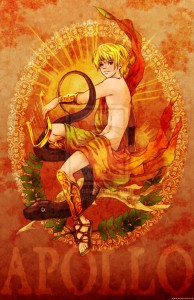 Apollo Greek God - Art Picture by zelda994612
Apollo Greek God - Art Picture by zelda994612
From this oracle once, the demigod Heracles (Hercules) passed by to ask for advice.
Pythia refused to answer him, so Heracles stole the sacred tripod and went elsewhere to establish an oracle. The Loxias (epithet of Apollo for his ambiguous oracles) persecuted him for a long time. When he finally reached Heracles, they fought nine whole days and nights continuously. The whole earth rattled from their hits. Eventually, Zeus split the two opponents by throwing them a thunderbolt between them.
Apollo was a beautiful god, tall, with great stature, blue eyes and long blond curls. Therefore, he had many romances with nymphs and mortals.
He loved the nymph Daphne, the daughter of the river god Peneus of Thessaly. She was very beautiful and many lads and known heroes asked her father to marry her. Peneus begged her to be married and give him grandchildren. Daphne however, being stubborn head, would not listen to her elder father, preferring to hunt in the forests and to accompany the virgin Artemis.
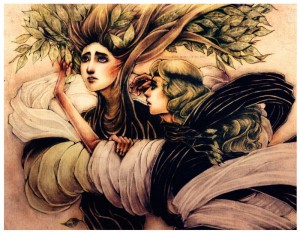 Greek God Apollo and Daphne - Art Picture by isnukwin
Greek God Apollo and Daphne - Art Picture by isnukwin
Once, when Apollo met her, he was dazzled by her beauty and wanted to make her his mate. However, the Nymph did not respond to the god’s call and fled to the mountain. For whole days and nights Phoebus (an epithet of Apollo meaning radiant) was chasing her among the shrubs and bushes, shouting at her that he was not a random but the brilliant groom Apollo honored by gods and mortals. However, the moment he was about to catch up with her, the bride asked her father to save her from the embrace of the god.
Then Peneus pitied his daughter and transformed her to the namesake tree. Daphne's legs became the roots of laurel tree. Her body formed the tree's trunk. Her arms transformed to the tree's branches. Finally, her hair became the famous tree's leaves. Apollo weeping inconsolably hugged the tree and after failing to mingle with the bride while she was alive, vowed that henceforth the laurel would be his sacred tree and he would always wore a laurel wreath.
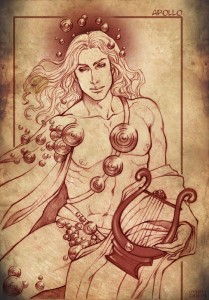 Apollo Greek God - Art Picture by Stregatto10
Apollo Greek God - Art Picture by Stregatto10
From his relationship with the goddess of Thessaly, the nymph Cyrene, Apollo had a son named Aristeus.
Cyrene lived a wild life in the forests of Pindos and protected the herds of her father. One day she attacked unarmed a lion, fought with it and finally defeated it. Phoebus saw her glorious feat and fell in love with her. Then kidnapped her and driving his golden chariot, flying over lands and seas, led her to Libya. There, mated with her in a golden palace.
Apollo also had romances with the Muses. A myth says that from Thalia he had acquired Korybantes. Korybantes were demons belonging to the entourage of Dionysus, with Satyrs and other forest elves.
By Urania he obtained the musicians Linos and Orpheus, who calmed the whole nature playing the flute and taming wild beasts. In addition, Apollo is the father of Asclepius, god of medicine.
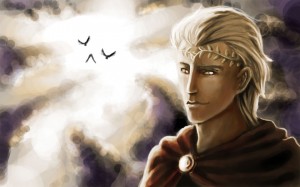 Apollo Greek God - Art Picture by shyfe
Apollo Greek God - Art Picture by shyfe
According to a legend, the flirty god mated with the Coronis and got her pregnant. However, during the time that she was waiting for the child, she was unfaithful to the god and mated with a mortal. When Apollo learned about this infidelity, enraged by the insult, killed his unfaithful Coronis.
However, the moment her body was placed on the fire and was ready to burn, the vengeful god transformed into a vulture, swooped and pulled the child from her bowels, which was still alive.
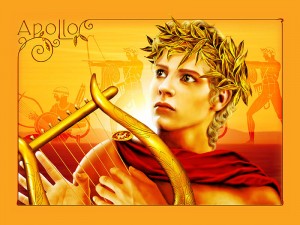 Apollo Greek God - Art Picture by iizzard
Apollo Greek God - Art Picture by iizzard
Marpisa, the princess of Aetolia, had the same misfortune. Apollo loved the young girl, but the mortal Idas with a winged chariot donated by Poseidon stole Marpisa and led her to Messina. There, Idas and Apollo fought each other but Zeus separated them. Marpisa had the right to choose between the two lovers. The god besought her, giving her promises of eternal loyalty and devotion. His effort ended in vain, as she chose the mortal Idas. The reason was that she feared that the immortal and eternally young Apollo would abandon her when she would grow old and would no more have the beauty and freshness of youth.
Nevertheless, love did not favor the god in the case of Cassandra, daughter of Priam. Apollo loved Cassandra and in order to win her, he promised to teach her the art of divination. The young princess agreed, but when she learned the art well, abandoned the god. Another myth says that Apollo finally mated with Cassandra and had a son, Troilus, by her.
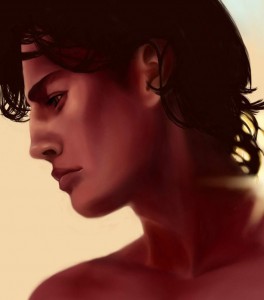 Apollo Greek God - Art Picture by niji707
Apollo Greek God - Art Picture by niji707
In Greece’s mainland, many believed that Apollo was the lover of the local heroine Fthia. He had three sons with her, Doros, Laodontas and Polypoiti, but Etolos killed all three of them. In Colophon, they believed that Apollo mated with Manto, the daughter of the blind seer Tiresias and from his sperm, the great seer Nomos (Law) was born. In Crete, the amatory god loved Akalli, the daughter of Minos. The fruit of their secret relationship was Miletus. Just after Akalli gave birth, she left the newborn in the woods because she was afraid her father. Apollo cared for his son to live, sending wolves to protect him and a female wolf to suckle him.
In Athens, the elfish god raped Creusa, daughter of King Erechtheus. Just after she gave birth, she abandoned her child in the wilderness. Apollo made sure to bring the baby to Delphi, where Pythia grew it up. This son of Apollo who so badly came to life was Ionas (Ion).
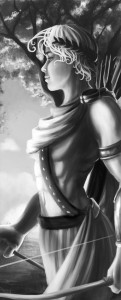 Apollo Greek God - Art Picture by Alayna
Apollo Greek God - Art Picture by Alayna
Various myths describe that Apollo also loved young men. Most important is his erotic adventure with Hyacinth, a tremendously beautiful young man. One day that the two were playing with the disk, the fierce Zephyros (wind) that envied the god, altered the disc’s trajectory that hit Hyacinth and killed him instantly. Phoebus (an epithet given to Apollo) was inconsolable after his friend's death. In order to make his name immortal, he transformed him in the famous namesake flower.
Some Greek myths speak of how Apollo was forced twice to work as a slave serving mortals. The first time was when, along with Poseidon, Hera and Athena wanted to take the power of Zeus, trying to tie him with huge iron chains and hang him on the celestial dome. However, the conspiracy failed and Apollo’s punishment was to guard the flocks of King Laomedon of Troy, on the slopes of Mount Ida. Apollo accepted his punishment, since he could not even talk back to his father, the almighty Zeus.
However, once one year passed, King Laomedontas refused to pay the god for his service and dismissed him. When Apollo complained, the king threatened to cut off his ears and that would sell him as a slave. Once Apollo regained his divine power, he sent a deadly plague in Troy that ravaged the country for six whole months. Women started giving birth to dead children. The flocks were decimated and the crops were drying out without paying off.
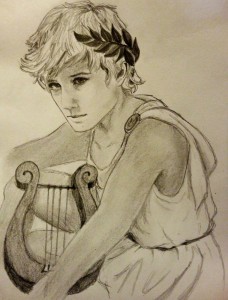 Apollo Greek God - Art Picture by daughtergothel
Apollo Greek God - Art Picture by daughtergothel
Apollo passed the test of shepherd again for a second time. This happened when Zeus killed Asclepius with a thunder because he had progressed so much in medicine, so he was even able to resurrect the dead. Phoebus badly wounded by the death of his son and in order to avenge, marked with his golden arrows over Olympus the Cyclopes, who had built the thunder. Zeus, indignant by the behavior of Apollo was not joking at all. He wanted to imprison his son in the dark and inhospitable Tartarus, in the bowels of Mother Gaia. However, Leto begged him to lighten his sentence. Then only Zeus relented and ordered Apollo to be at the service of King Admetus.
When Apollo reached the Ferres of Thessaly and presented himself to Admetus, the king judging from the sweetness of his form and his divine beauty figured that he was a god disguised as a mortal. He immediately fell to his knees and offered him his throne. Apollo, however, explained him that it was the will of Zeus to work in his service.
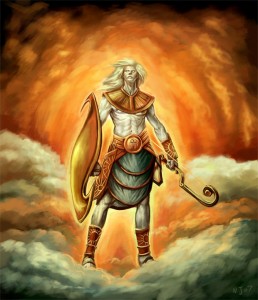 Apollo Greek God - Art Picture by TaekwondoNJ
Apollo Greek God - Art Picture by TaekwondoNJ
Excited by the good behavior and respect of Admetus, the god brought prosperity to the palace and throughout the country. All cows gave birth to two calves at a time, the fields bear fruit twice a year, and more and more wealth concentrated in the hands of the noble Admetus.
Apollo took part in the fierce battle with the Giants (Gigantomachy) alongside his father Zeus. He also participated in the Trojan War and was always on the side of the Trojans. He even contributed to the completion of the Argonaut’s Campaign helping Jason get to the magical land of Aiiti.
Apollo had to use his arrows twice in order to defend his mother, Leto. The first time was when the giant Tityus wished to mate with Leto and tried to rape her. The divine son acted swiftly. He immediately killed the giant with his arrows and saved his mother.
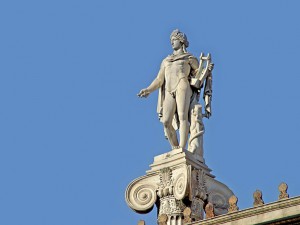 Greek God Apollo Statue on top of building
Greek God Apollo Statue on top of building
Another time, with his sister Artemis killed Niobe's children, except two, when she boasted that she was happier and luckier than Leto, who only two children while Niobe had fourteen. Apollo killed with his arrows her sons and Artemis her daughters. Zeus pitied Niobe and transformed her into a rock that is forever crying for the loss of her children.
Apollo was generally the god of music and poetry. Therefore, he presided over Mount Helicon, the contest of the Muses. Moreover, he was god of divination.
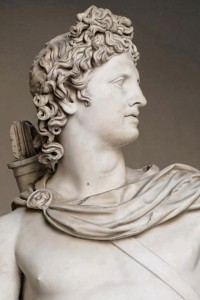 Greek God Apollo Statue
Greek God Apollo Statue
They believed that he inspired both seers and poets. He was also a shepherd god that his loves with the nymphs and young men that transformed to flowers were linking him with the vegetation and nature.
Still, Apollo was a warrior god with golden bows and arrows that could send his revenge from far away.
The sacred animals dedicated to Apollo were the wolf and deer. His sacred birds were the swan, the vulture and the crow. Finally, his favorite marine animal is dolphin, whose name is reminiscent of Delphi, the main sanctuary of Apollo. Laurel was eminently the sacred plant of the god.
Apollo was the personification of light and sun. He represented the arts, music and poetry, that were so much loved and cultivated by the ancient Greeks.
Please leave a comment if you liked this article 🙂
All pictures are also uploaded in Albums on the Greek Mythology Pantheon page on Facebook, visit us at :


23 COMMENTS
who is the author of this website
I am 🙂
It also says it on the end of the page.
when was the date this page was made?
This page was made at 28 May 2013, why do you ask?
Because they need it for citing sources
cool
very very very very good
Wonderful article
hey babyys cool page ily all the pics
MUA MUA
catch u later
Who published this website?
You can see my information on the bottom of the page 🙂
Lefteris Koukakis
a civilisation can be gone in a second. Gods live forever. thank you
i need this because this is my homework
a civilisation can be gone in a second.Gods live forever.thank you
This s great for school
Yeah. I’m doing greek mythology in my class in two days (My teacher is OBSESSED over greek).
Bloody brilliant!!!
Aaaaaeeee, that’s pretty good
Does Apollo fear anything? This is great!
my name jeff
This article was very helpful and interesting.
Do you know what apollo needs because every greek god needed something but I just wanna know what he needed because Aphrodite needed a chariot.
Actually Apollo was the one with the chariot